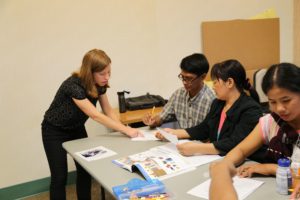Learning from my Elders
What refugees have to teach us

“Arm. Armmmmm.” I repeat the word slowly, exaggerating the ending “m” sound as my elderly Congolese student mimics me. His facial muscles contort as he tries to make his mouth move in unfamiliar ways. We repeat the word several times, touching our arms as we do so to cement the meaning. He teaches me the word in Kinyarwanda and I repeat it, jotting it down phonetically on a worksheet so I can remember it for next time. Then he painstakingly copies “a-r-m” on his paper. I check his spelling, modeling again how to write the lowercase “m.” He corrects his mistake and we move to the next word.
As an English teacher at Exodus, I work with students at all levels of English proficiency. Many have had some education in their home country and quickly pick up the basics that they need to function in the U.S. They come to class in between doctor’s appointments, job interviews, meetings with case managers, and the many other activities they participate in as part of Exodus’ resettlement services. Others, like the student I am working with today, have worked all their lives to support their families and have never had the chance to go to school. When they arrive in my classroom, they are just learning how to hold a pencil.
I enjoy working with all of my English students, but there is something special about working with the elders. These men and women – grandparents, matriarchs and patriarchs of their families – are in their 60s and 70s, have worked physically demanding jobs since childhood, have cradled infants, held babies on their backs while they worked in their fields, guided their families through war, flight, lengthy resettlement applications, a hard journey across the world. They have sacrificed everything they have ever known so their children can have a better life. They have seen it all and are the respected elders of their communities.
And yet – they are humble enough to show up to school for the first time in their lives, pick up a pencil in shaky, work-calloused hands, and say (in their language), “OK teacher. I’m ready.”
My elder students may not learn English as fast as their children will. They may not advance to high-wage jobs or adapt as quickly to American ways. But, they have taught me the most valuable life lessons I will ever learn: to never give up, to swallow my pride and accept a learner’s posture, to cheerfully dive into new experiences, to stoke a hunger to learn new things at any age.
They have set a high bar for not only their own families and community, but for all of us.
This #Giving Tuesday, I hope you will join me in honoring them. There are so many ways you can help: Make a donation to support Exodus’ programs, purchase a winter coat or a warm blanket from our Amazon Wish list, or give your time as a volunteer at our front desk.
When you give to Exodus, you are giving someone a second chance at life. Thank you for honoring our resilient and courageous families with your gift.
– Kari Fritz, LCORE Instructor

